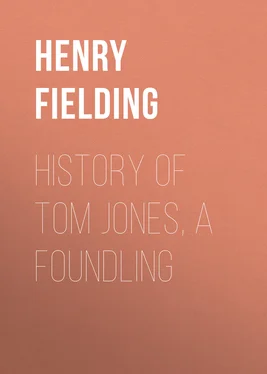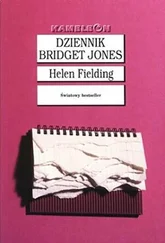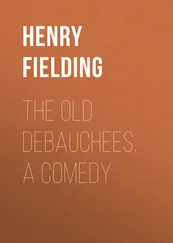Henry Fielding - History of Tom Jones, a Foundling
Здесь есть возможность читать онлайн «Henry Fielding - History of Tom Jones, a Foundling» — ознакомительный отрывок электронной книги совершенно бесплатно, а после прочтения отрывка купить полную версию. В некоторых случаях можно слушать аудио, скачать через торрент в формате fb2 и присутствует краткое содержание. Жанр: foreign_prose, foreign_antique, на английском языке. Описание произведения, (предисловие) а так же отзывы посетителей доступны на портале библиотеки ЛибКат.
- Название:History of Tom Jones, a Foundling
- Автор:
- Жанр:
- Год:неизвестен
- ISBN:нет данных
- Рейтинг книги:4 / 5. Голосов: 1
-
Избранное:Добавить в избранное
- Отзывы:
-
Ваша оценка:
- 80
- 1
- 2
- 3
- 4
- 5
History of Tom Jones, a Foundling: краткое содержание, описание и аннотация
Предлагаем к чтению аннотацию, описание, краткое содержание или предисловие (зависит от того, что написал сам автор книги «History of Tom Jones, a Foundling»). Если вы не нашли необходимую информацию о книге — напишите в комментариях, мы постараемся отыскать её.
History of Tom Jones, a Foundling — читать онлайн ознакомительный отрывок
Ниже представлен текст книги, разбитый по страницам. Система сохранения места последней прочитанной страницы, позволяет с удобством читать онлайн бесплатно книгу «History of Tom Jones, a Foundling», без необходимости каждый раз заново искать на чём Вы остановились. Поставьте закладку, и сможете в любой момент перейти на страницу, на которой закончили чтение.
Интервал:
Закладка:
It may seem remarkable, that, of four persons whom we have commemorated at Mr Allworthy’s house, three of them should fix their inclinations on a lady who was never greatly celebrated for her beauty, and who was, moreover, now a little descended into the vale of years; but in reality bosom friends, and intimate acquaintance, have a kind of natural propensity to particular females at the house of a friend – viz., to his grandmother, mother, sister, daughter, aunt, niece, or cousin, when they are rich; and to his wife, sister, daughter, niece, cousin, mistress, or servant-maid, if they should be handsome.
We would not, however, have our reader imagine, that persons of such characters as were supported by Thwackum and Square, would undertake a matter of this kind, which hath been a little censured by some rigid moralists, before they had thoroughly examined it, and considered whether it was (as Shakespear phrases it) “Stuff o’ th’ conscience,” or no. Thwackum was encouraged to the undertaking by reflecting that to covet your neighbour’s sister is nowhere forbidden: and he knew it was a rule in the construction of all laws, that “ Expressum facit cessare tacitum. ” The sense of which is, “When a lawgiver sets down plainly his whole meaning, we are prevented from making him mean what we please ourselves.” As some instances of women, therefore, are mentioned in the divine law, which forbids us to covet our neighbour’s goods, and that of a sister omitted, he concluded it to be lawful. And as to Square, who was in his person what is called a jolly fellow, or a widow’s man, he easily reconciled his choice to the eternal fitness of things.
Now, as both of these gentlemen were industrious in taking every opportunity of recommending themselves to the widow, they apprehended one certain method was, by giving her son the constant preference to the other lad; and as they conceived the kindness and affection which Mr Allworthy showed the latter, must be highly disagreeable to her, they doubted not but the laying hold on all occasions to degrade and vilify him, would be highly pleasing to her; who, as she hated the boy, must love all those who did him any hurt. In this Thwackum had the advantage; for while Square could only scarify the poor lad’s reputation, he could flea his skin; and, indeed, he considered every lash he gave him as a compliment paid to his mistress; so that he could, with the utmost propriety, repeat this old flogging line, “Castigo te non quod odio habeam, sed quod AMEM. I chastise thee not out of hatred, but out of love.” And this, indeed, he often had in his mouth, or rather, according to the old phrase, never more properly applied, at his fingers’ ends.
For this reason, principally, the two gentlemen concurred, as we have seen above, in their opinion concerning the two lads; this being, indeed, almost the only instance of their concurring on any point; for, beside the difference of their principles, they had both long ago strongly suspected each other’s design, and hated one another with no little degree of inveteracy.
This mutual animosity was a good deal increased by their alternate successes; for Mrs Blifil knew what they would be at long before they imagined it; or, indeed, intended she should: for they proceeded with great caution, lest she should be offended, and acquaint Mr Allworthy. But they had no reason for any such fear; she was well enough pleased with a passion, of which she intended none should have any fruits but herself. And the only fruits she designed for herself were, flattery and courtship; for which purpose she soothed them by turns, and a long time equally. She was, indeed, rather inclined to favour the parson’s principles; but Square’s person was more agreeable to her eye, for he was a comely man; whereas the pedagogue did in countenance very nearly resemble that gentleman, who, in the Harlot’s Progress, is seen correcting the ladies in Bridewell.
Whether Mrs Blifil had been surfeited with the sweets of marriage, or disgusted by its bitters, or from what other cause it proceeded, I will not determine; but she could never be brought to listen to any second proposals. However, she at last conversed with Square with such a degree of intimacy that malicious tongues began to whisper things of her, to which, as well for the sake of the lady, as that they were highly disagreeable to the rule of right and the fitness of things, we will give no credit, and therefore shall not blot our paper with them. The pedagogue, ‘tis certain, whipped on, without getting a step nearer to his journey’s end.
Indeed he had committed a great error, and that Square discovered much sooner than himself. Mrs Blifil (as, perhaps, the reader may have formerly guessed) was not over and above pleased with the behaviour of her husband; nay, to be honest, she absolutely hated him, till his death at last a little reconciled him to her affections. It will not be therefore greatly wondered at, if she had not the most violent regard to the offspring she had by him. And, in fact, she had so little of this regard, that in his infancy she seldom saw her son, or took any notice of him; and hence she acquiesced, after a little reluctance, in all the favours which Mr Allworthy showered on the foundling; whom the good man called his own boy, and in all things put on an entire equality with Master Blifil. This acquiescence in Mrs Blifil was considered by the neighbours, and by the family, as a mark of her condescension to her brother’s humour, and she was imagined by all others, as well as Thwackum and Square, to hate the foundling in her heart; nay, the more civility she showed him, the more they conceived she detested him, and the surer schemes she was laying for his ruin: for as they thought it her interest to hate him, it was very difficult for her to persuade them she did not.
Thwackum was the more confirmed in his opinion, as she had more than once slily caused him to whip Tom Jones, when Mr Allworthy, who was an enemy to this exercise, was abroad; whereas she had never given any such orders concerning young Blifil. And this had likewise imposed upon Square. In reality, though she certainly hated her own son – of which, however monstrous it appears, I am assured she is not a singular instance – she appeared, notwithstanding all her outward compliance, to be in her heart sufficiently displeased with all the favour shown by Mr Allworthy to the foundling. She frequently complained of this behind her brother’s back, and very sharply censured him for it, both to Thwackum and Square; nay, she would throw it in the teeth of Allworthy himself, when a little quarrel, or miff, as it is vulgarly called, arose between them.
However, when Tom grew up, and gave tokens of that gallantry of temper which greatly recommends men to women, this disinclination which she had discovered to him when a child, by degrees abated, and at last she so evidently demonstrated her affection to him to be much stronger than what she bore her own son, that it was impossible to mistake her any longer. She was so desirous of often seeing him, and discovered such satisfaction and delight in his company, that before he was eighteen years old he was become a rival to both Square and Thwackum; and what is worse, the whole country began to talk as loudly of her inclination to Tom, as they had before done of that which she had shown to Square: on which account the philosopher conceived the most implacable hatred for our poor heroe.
Chapter vii. – In which the author himself makes his appearance on the stage
Though Mr Allworthy was not of himself hasty to see things in a disadvantageous light, and was a stranger to the public voice, which seldom reaches to a brother or a husband, though it rings in the ears of all the neighbourhood; yet was this affection of Mrs Blifil to Tom, and the preference which she too visibly gave him to her own son, of the utmost disadvantage to that youth.
Читать дальшеИнтервал:
Закладка:
Похожие книги на «History of Tom Jones, a Foundling»
Представляем Вашему вниманию похожие книги на «History of Tom Jones, a Foundling» списком для выбора. Мы отобрали схожую по названию и смыслу литературу в надежде предоставить читателям больше вариантов отыскать новые, интересные, ещё непрочитанные произведения.
Обсуждение, отзывы о книге «History of Tom Jones, a Foundling» и просто собственные мнения читателей. Оставьте ваши комментарии, напишите, что Вы думаете о произведении, его смысле или главных героях. Укажите что конкретно понравилось, а что нет, и почему Вы так считаете.












